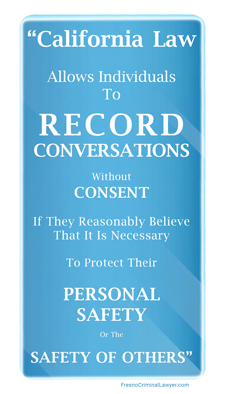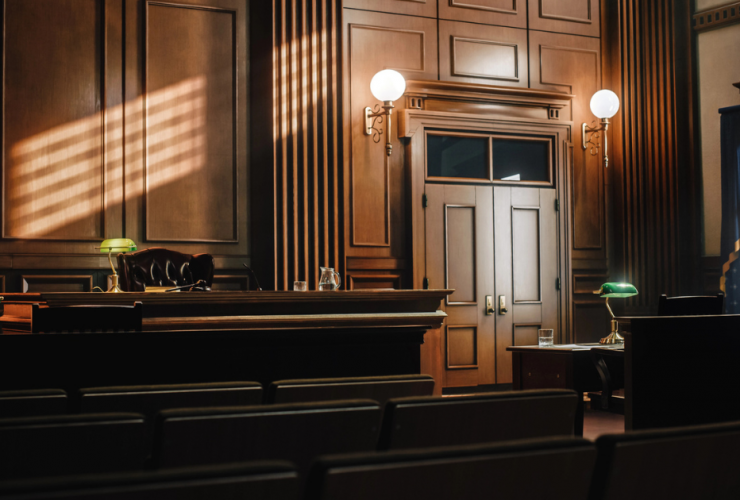When is it Admissible to Record Someone Without Their Consent?
While it’s generally an illegal invasion of privacy to record a private conversation, there are exceptions … so when is it admissible to record someone without their consent in California?
Before we get to the exceptions, it’s important to know that California follows a “two-party consent” law, also known as an all-party consent law. This means that the consent of all individuals participating in a conversation is required before it can be legally recorded.
It also means that recording a conversation without the knowledge and consent of all parties involved can lead to legal consequences of fines of up to $2,500 and/or imprisonment for up to one year in county jail or state prison (as per California Penal Code Section 632).
Sometimes called the Invasion of Privacy Act, PC Section 632 states that it is illegal to “eavesdrop on or record confidential communications without the consent of all parties involved.”
Confidential communications refer to conversations where the participants have a reasonable expectation of privacy. This applies to both in-person conversations and telephone or electronic communications.
As a rule, and from a criminal defense perspective, we generally advise to not record someone unless all other parties are advised and consent to being recorded.
But, of course, there are exceptions.
Exceptions that Make it Admissible to Record Someone Without Their Consent
California law also states that “one party to a confidential communication is not prohibited from recording the communication for the purpose of obtaining evidence reasonably believed to relate to the commission by another party to the communication of the crime of extortion, kidnapping, bribery, any felony involving violence against the person, including but not limited to, human trafficking, as defined in Section 236.1, or a violation of Section 653m, or domestic violence as defined in Section 13700 of the Penal Code.”
Other exceptions to the “two-party consent” law may include the following:
Public Conversations
If the conversation is taking place in a public space where individuals do not have a reasonable expectation of privacy, it may be admissible to record without consent. However, it’s important to exercise caution and ensure that no other laws or regulations are being violated in the process.
Law Enforcement
Law enforcement agencies in California have specific guidelines and legal authority to conduct electronic
surveillance, including wiretapping and recording conversations, as part of their investigations. These actions are generally governed by specific legal procedures and requirements.
Personal Safety
California law allows individuals to record conversations without consent if they reasonably believe that it is necessary to protect their personal safety or the safety of others. Rather than for presenting a criminal defense, this exception is intended to address situations where recording can provide evidence showing threats of — and therefore possibly proactively prevent — extortion, kidnapping, bribery, and any felony involving violence against the person, including, but not limited to, human trafficking.
Protection of Rights and Evidence
Recording conversations without consent may also be admissible when it is done to protect one’s rights or to gather evidence in certain circumstances. For instance, in the already mentioned cases of extortion, kidnapping, bribery, and felonies involving violence against the person, including, but not limited to, human trafficking, recording someone without their knowledge or consent may be seen as justifiable in order to provide evidence.
Journalistic Purposes
Even with two-party consent, California recognizes that journalists may have certain privileges and protections when it comes to recording conversations in the course of their work. However, journalists still need to adhere to ethical standards and balance the public interest served against the potential intrusion into individuals’ privacy.
Consent Given
Of course, if all parties involved in the conversation are aware and have given their consent to be recorded, then recording without further consent is permissible. With consent, the recordings generally can be used as evidence in criminal cases.
When in Doubt, Seek Legal Advice
The admissibility of evidence gained by recording someone without their consent is a complex issue with legal and ethical implications. Because PC Section 632 also states that “evidence obtained as a result of eavesdropping upon or recording a confidential communication in violation of this section is not admissible in any judicial, administrative, legislative, or other proceeding.”
If you are considering recording someone to gather evidence for a criminal case, always seek legal advice first.
And if you’ve been accused or charged with recording a conversation without the knowledge and consent of all parties involved, obtain legal counsel from an experienced criminal defense attorney right away to explore possible legal defenses and to protect your rights.
If you need criminal defense legal help, call 559-691-6222 or click here to request a free consultation. We’ll get back to you right away.
Have More Questions Regarding Criminal Defense?
We do our best to answer common questions on our FAQ Page.





